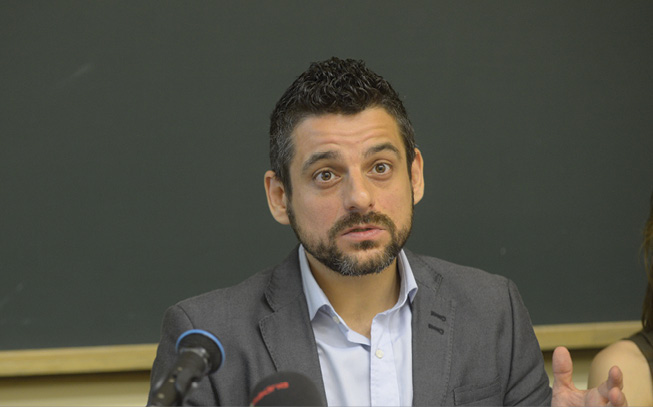Changing Spain’s politics


During a visit to Madrid to examine how Spain handled the financial crisis, Owen McQuade and Dave Whelan met with Ivan Ayala, an economist with the country’s new radical political party Podemos.
Like many in Spain, Ivan Ayala started going to the main square in Madrid, Puerta del Sol, after work, to participate in the Indignados protests. “The Indignados movement had no formal structure, no clear leaders and no official spokesperson and yet were a potent force in Spain in leading opposition to the Government’s austerity programme,” explains Ayala.
“Podemos came from the discontent of the Spanish people, who were suffering austerity measures imposed by the Eurozone.” Much of the discontent emanated from the left of the political spectrum. When the financial crisis hit there was a socialist government in power. Ayala says that up until then the Government had been progressive on social issues such as gay marriage and rights for disabled people but when the crisis unfolded “they choose neoliberal recipes which caused huge discontent”.
Podemos has grabbed the headlines since the crisis and has now almost 20 per cent of the seats in Spain’s parliament. “Podemos has changed the
politics of Spain and re-configured the political set-up,” argues Ayala.
“Many things were not being discussed and we put pressure on the system to address these issues,” he continues. Issues Podemos were pushing included the fiscal framework of the European Union and that Spain should renegotiate the way it was reducing its deficit – other political parties were saying this was impossible. Podemos also designed an alternative fiscal programme; a more expansive programme to help the economy grow. “The established parties said that this was madness and would be impossible to implement. But the current government has negotiated with Brussels another path for the deficit reduction and in 2015 the Spanish Government implemented expansionist policies, which led to growth in 2016.”
The reality is that the Spanish economy is growing but Spain is not meeting its deficit criteria, “that is something we were saying since the beginning of the crisis. The political discussion is now more friendly to the Podemos point of view.” Although the Spanish economy is now growing, Ayala says that it is not producing quality jobs but only “precarious jobs, temporary in nature”. Spain has the second highest proportion of temporary workers in the OECD “and huge inequality, linked to the labour market”. To address this inequality Podemos has proposed a progressive tax reform which was portrayed as tax increases but again Ayala highlights the fact that after giving tax cuts in the election year of 2015 the Spanish Government has just implemented a similar progressive tax reform.
Tax and labour market
When asked to take us through Podemos’ economic policies, the first issue Ayala focuses upon is corporation tax. Historically, large companies in Spain paid an actual rate of 4 to 5 per cent. In the 2015 election year, the Conservative government lowered the rate to 0 per cent for large companies. Podemos proposed a rate of 15 per cent and as with the previous examples Ayala gave, the Government are now implementing the higher rate proposed by the new radical party.
A common theme during our visit to Madrid was the inflexibility of the Spanish labour market. However, Ayala disputes this and highlights the fact that during the financial crisis people were laid off very quickly with the unemployment rate rising from 8 per cent at the end of 2007 to 16 per cent in 2009: “that is not a rigid labour market”. He sees the labour market as fixed, but as having too many incentives for temporary working. Although temporary contracts must be justified, nine out of 10 new jobs are temporary, which he says is a measure of how companies are abusing the use of temporary contracts. “It is an ideological argument. Rigidity has negative connotations, whereas Podemos argues that fewer temporary contracts incentivises higher productivity.”
Does the mainstream dismiss Podemos?
“We know we were challenging the system and therefore our economic arguments had to be very strong and robust. We were the first party to model our economic programme. We have a model of growth where we showed our policy compared to the Government’s policy. It showed how we could reduce the deficit, promote growth and impact on debt. Our economic programme addressed the structural problems in the Spanish economy.
“We have a lot of academics in our ranks who are used to arguing their case, backed up by evidence.” Ayala believes that Podemos’ economic policy has indeed once again influenced government policy: “the deficit figure renegotiated by the Government is very similar to that in our model and yet everyone had said that this was unfeasible.”
When we spoke to Ayala in late 2016 there had been two general elections in Spain with no outright winner. In early 2017, Spain now has a Conservative minority government, the People’s Party, under the leadership of Mariano Rajoy after a stand-off in late 2016 with the main socialist party PSOE.
Unsurprisingly, Ayala is critical of the Conservative government’s economic policies, particularly those in the run up to the 2015 election: “They played with everyone’s money in the run up to the 2015 election which they didn’t win [outright]. They implemented a series of economic measures that have compromised the public accounts today and we will all have to pay for that electoral bill.” Ayala acknowledges that the economic uncertainty around the time it took to form a government might have had an impact on investment. He is also concerned about the nature of the economic growth which is “mostly made up of low paid jobs”.
“We know we were challenging the system and therefore our economic arguments had to be very strong and robust.”
Economic priorities
When asked to outline Podemos’ economic priorities, Ayala is very firm on the party’s core priorities: “Our first priority is stopping austerity with a fiscal expansionary programme. This is the macroeconomic framework for all our proposals.” Podemos’ economic model forecasts a reduction in the deficit by increasing public spending to grow the economy by an additional one per cent. The Government forecast is 2.5 per cent and Podemos forecasts 3.5 per cent for 2017. To achieve this additional growth Podemos advocates progressive tax reform. “This framework allows us to finance our spending policies,” he says.
Current spending policy is directed to close the poverty gap in Spain with an income programme that includes policies to address things such as fuel poverty. The core of Podemos’ spending plans is its investment plan to promote the long-term growth of Spain and includes a National Energy Transition programme. This programme has two main pillars: the first pillar is the retrofitting of all Spanish buildings, that will see a reduction of €600 for the average household bill. “It will also allow us to recycle many workers laid off in the construction sector.” The second pillar is renewable energy, from R&D to implementation: “a comprehensive programme to make Spain a leader in renewable energy.”
When asked about other infrastructure, Ayala says that previous infrastructure investment has not been redistributive and has been concentrated on huge infrastructure projects. “We have better infrastructure than Germany, in some cases. That makes no sense as we don’t have the economic power of Germany but that was concomitant to the economic model of the last 20 years – huge firms building highways. Today we are witnessing the problems of that. In Madrid, there are two highways that were constructed by the State and given to private firms but they were very badly designed and the traffic was so low that they have now gone bankrupt leaving the tax payer with a €5 billion bill. The Spanish economy has not been redistributed and Podemos want to have more of a welfare state as in other European countries. We need infrastructure but not that of the last 20 years.”
A party of parties
“Podemos is a party of parties. It is more a social movement and the debate is very passionate. Sometimes our internal debates are public because we are very open and transparent and that is a good thing but on occasion not so good. Then suddenly there is a civil war of factions within the Socialist party PSOE, which has brought chaos to Spain’s second largest party. We should be negotiating with PSOE for a government of change, a progressive government, but it is imploding.”
On the morning of meeting Aylala there were 17 resignations from the board of PSOE but the leader Pedro Sanchez remains in place with the support of the party’s grass root members – a situation analogous to Jeremy Corbyn. The split in the socialist party had been around the issue of whether to abstain to allow for a minority Conservative government to be formed.
Populism
Commentators say that there is a debate in Podemos whether the party should represent all the left or just the radical left. “We were in the Indignados and we had ideas that were on both the left and on the right. We tried to gather up all the discontent in Spain. In Spain, we have a broad consensus around issues such as public health, education and public pensions and we concentrated on those issues. In my personal opinion, Podemos should gather all the discontent on both the left and right – I think that is possible. Podemos is very strong in younger people who do not think in terms of the left and right axis. That gives Podemos a huge potential and it has a very positive brand.”





